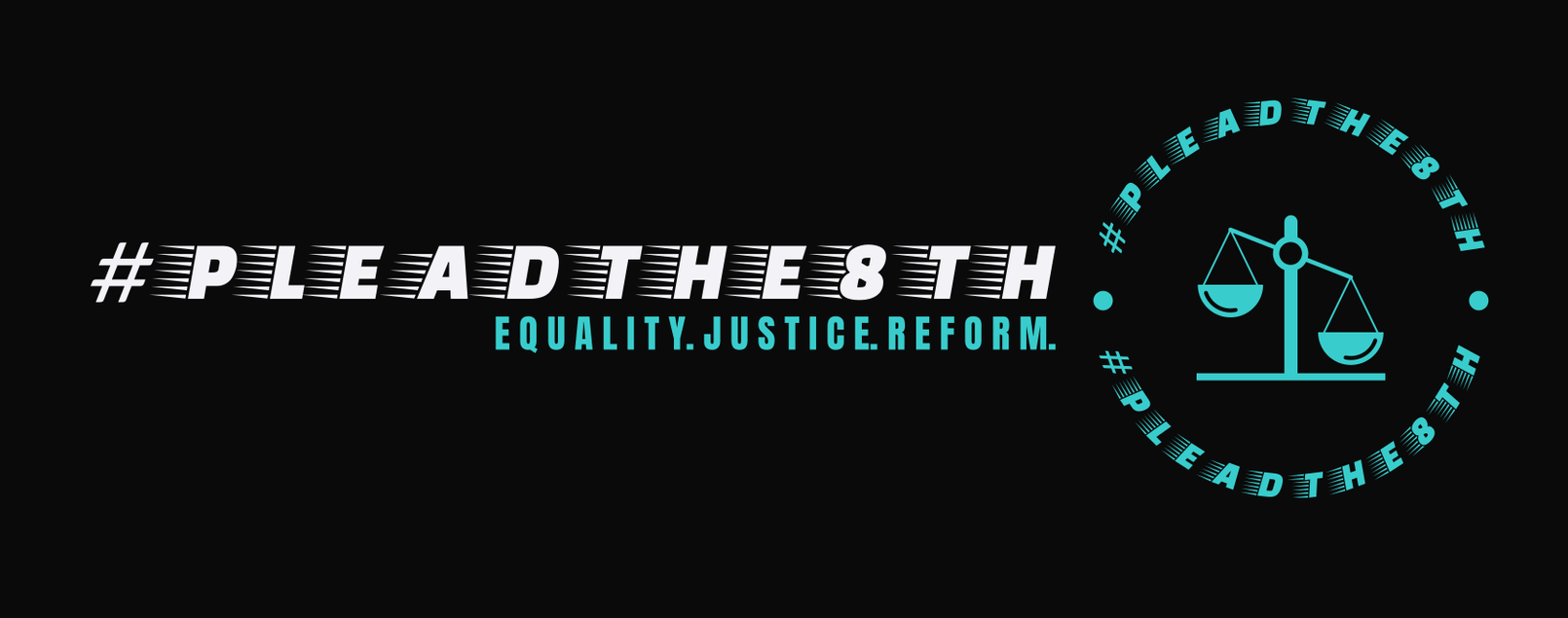Statistics: Disparities in Sentencing Pre-and-Post 2014
Explore statistics highlighting the changes and ongoing disparities in juvenile sentencing before and after significant legislative reforms in 2014.
Florida Youth Incarceration Data
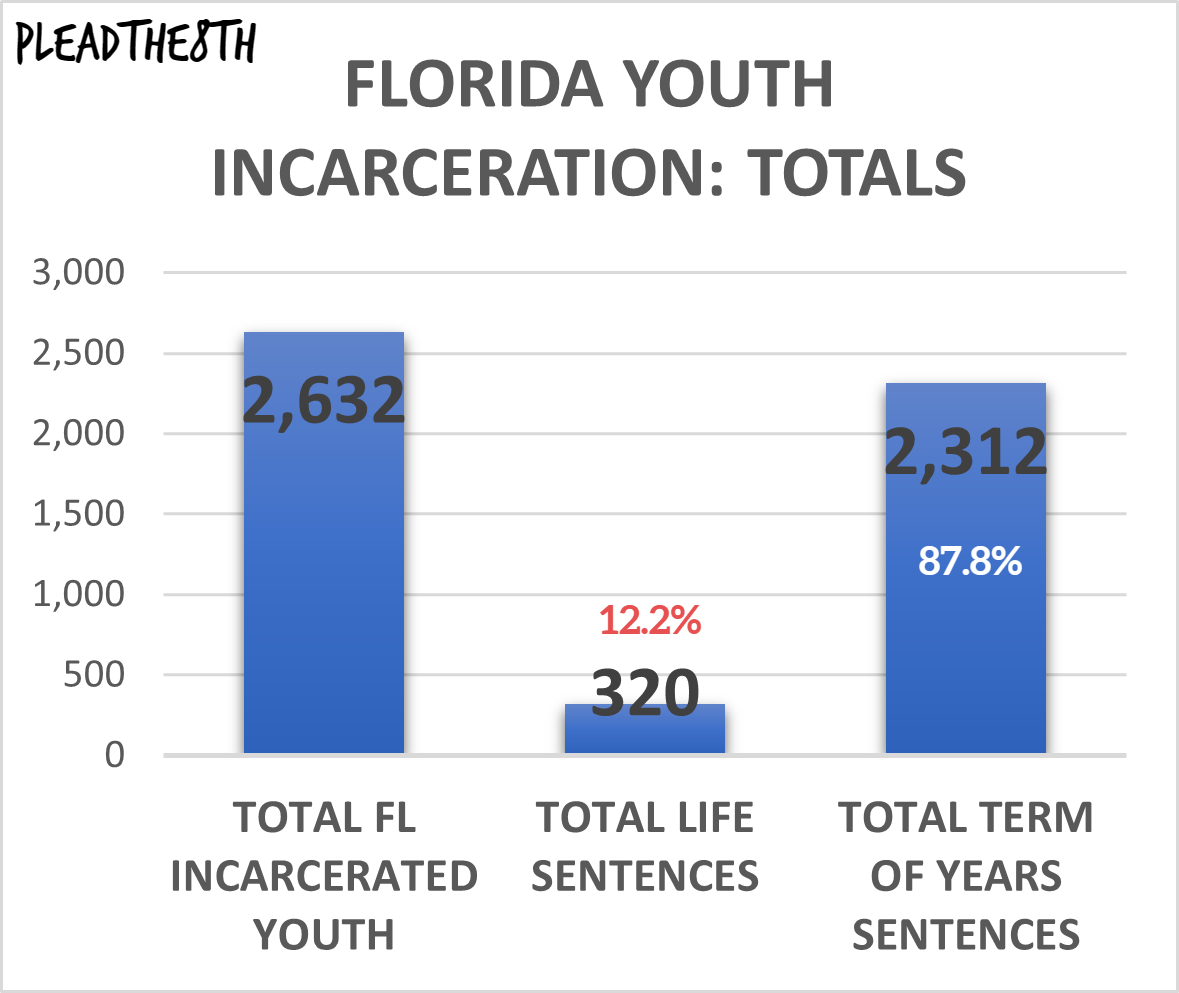
- Total Incarcerated Since Childhood in Florida: 2,632
- Total Florida Youth with a Life Sentence: 320 (12.2%)
- Total Florida Youth with a Term of Years Sentence: 2,312 (87.8%)
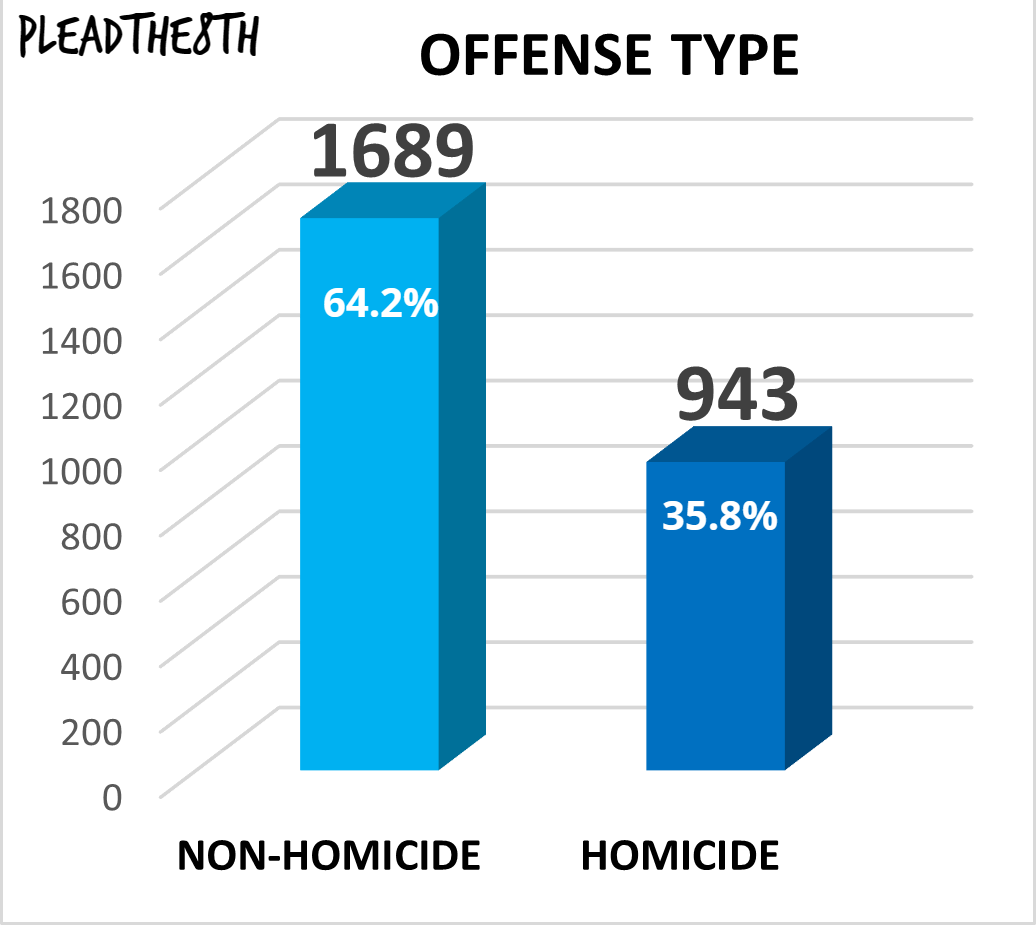
- Of the 2,632-youth incarcerated in Florida, 1,689 (64.2%) are for non-homicide offenses.
- Of the 2,632, 943 (35.9%) are for homicide offenses.
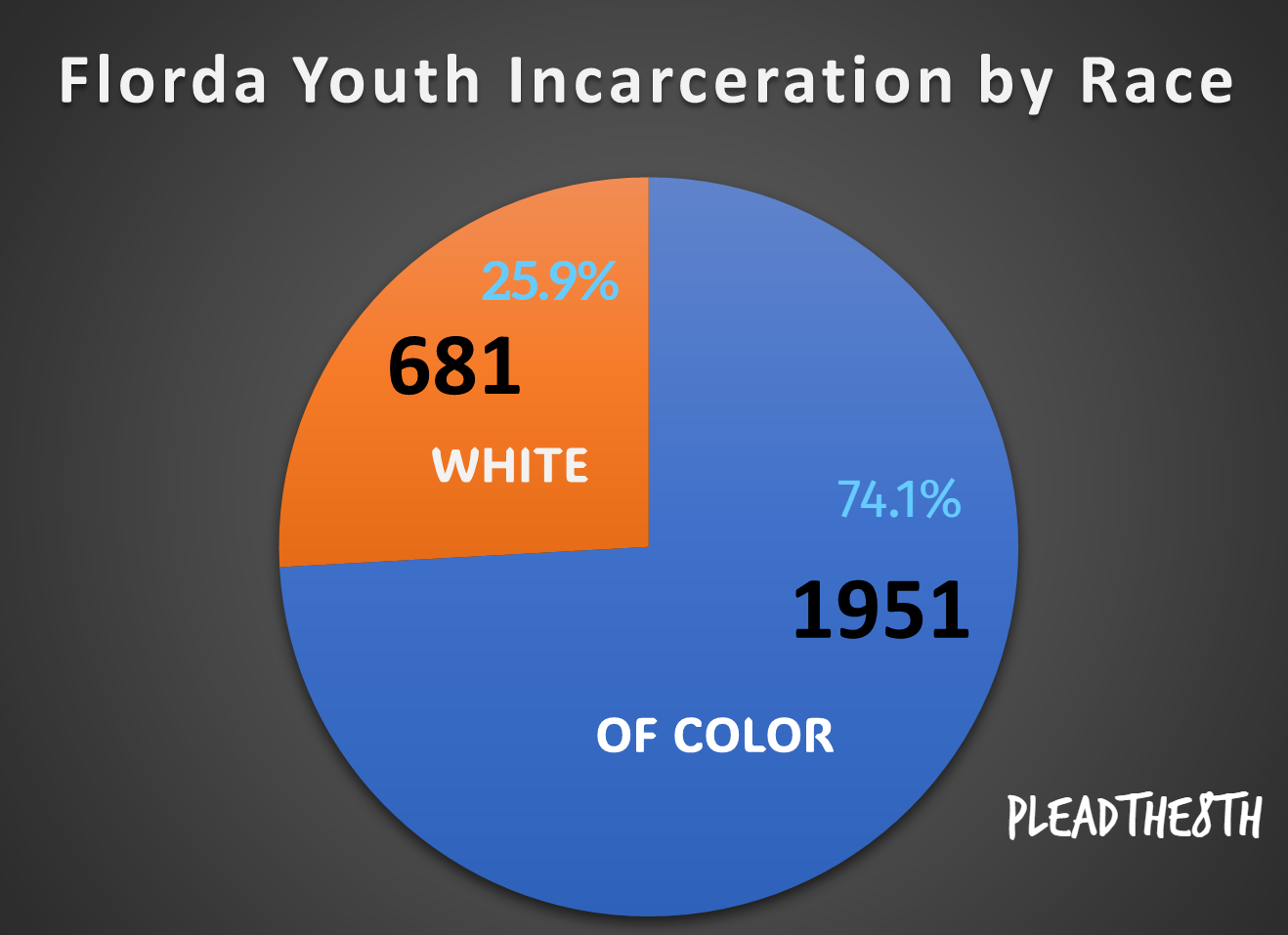
- Of 2,632 youth, 1,951 are of color. (74.1%)
- Of 2,632 youth, 681 are white. (25.9%)
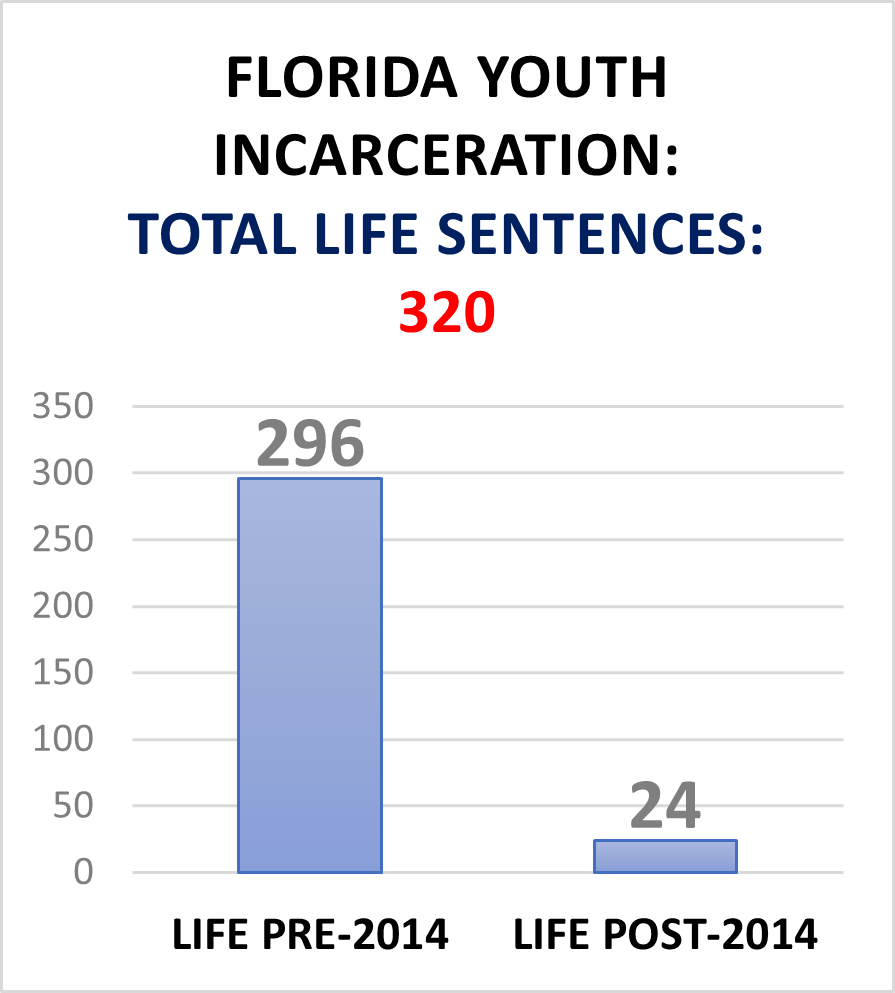
Following the U.S. Supreme Court rulings, many juveniles in Florida who were originally sentenced to life in prison were re-sentenced to a term of years punishment. The data above represents only those currently incarcerated with life sentences.
Historically, Florida has imposed excessive punishments on youth, especially prior to key U.S. Supreme Court rulings.
The chart below shows the top crimes for which Florida youth are incarcerated.
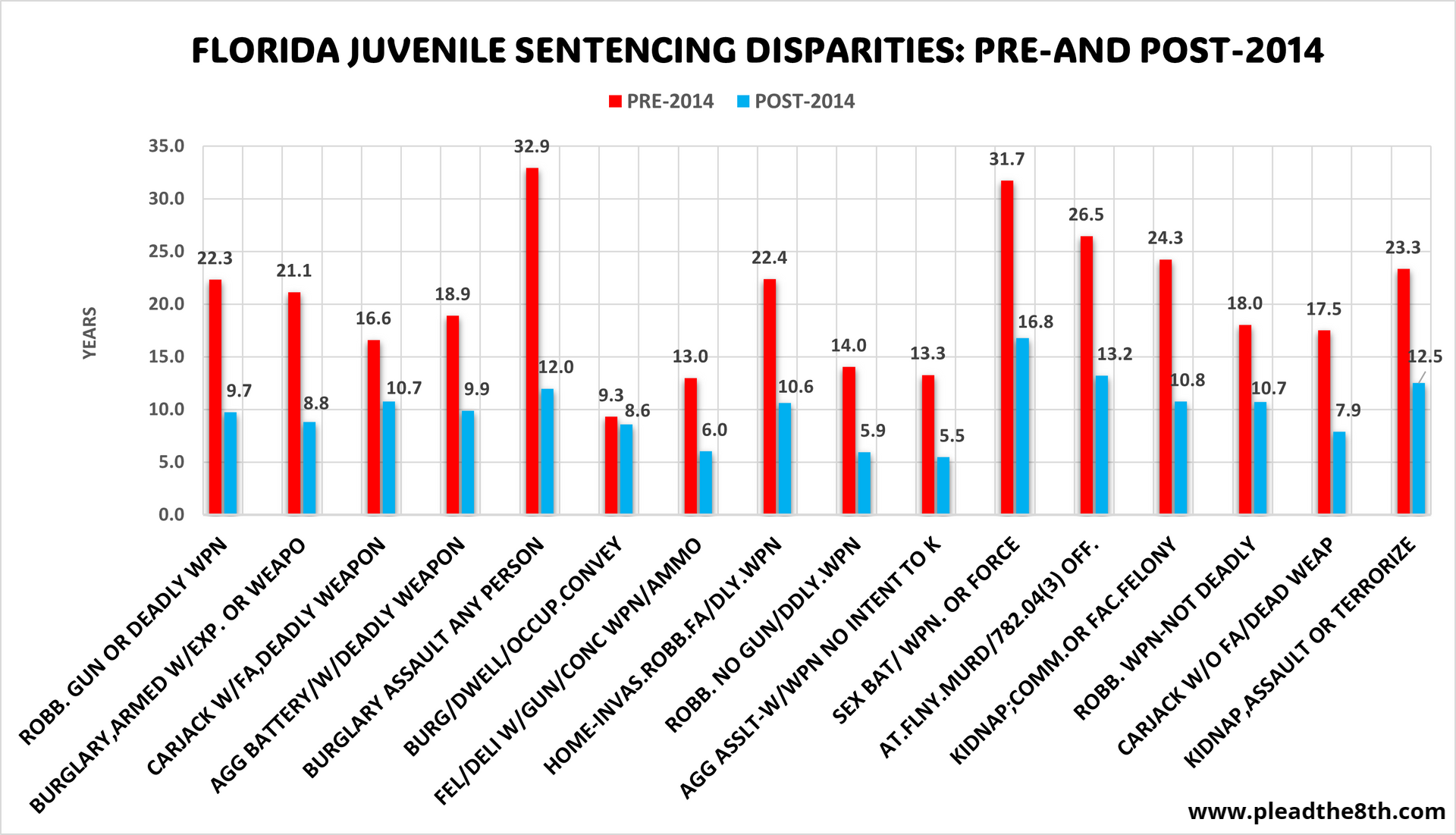
- The data reveals a marked decrease in the average sentence length for non-homicide offenses post-2014, suggesting an impact of legislative and judicial changes in juvenile sentencing practices.
- This data questions the appropriateness of long-term sentencing for non-homicide offenses committed by youth, as well as highlighting a notable shift towards less severe sentencing in recent years. It raises questions about the balance between punishment, rehabilitation, and the potential for change and growth in young offenders.
- The findings from this review highlight the need for ongoing scrutiny of juvenile sentencing practices in Florida, especially concerning racial disparities and the long-term impact of incarceration on youth.
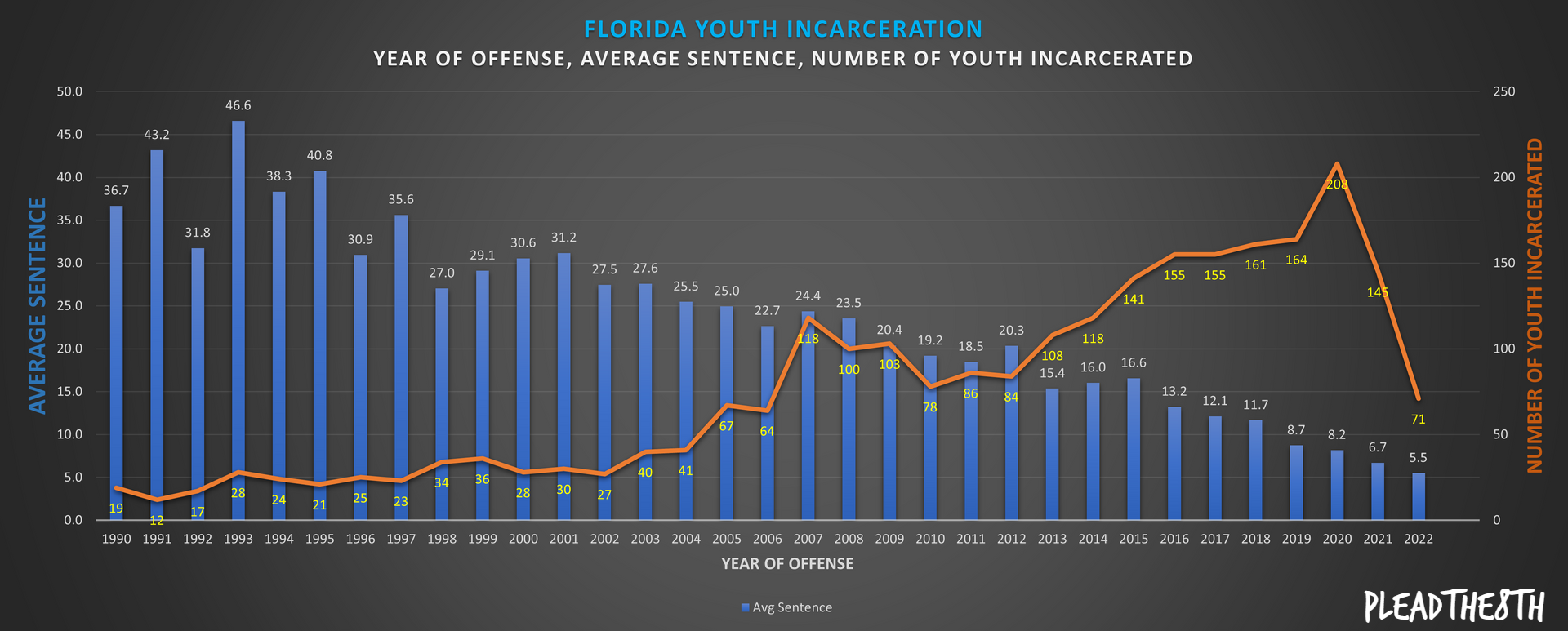
This chart provides a look at the number of Florida youths currently incarcerated by the year of offense in orange, compared to the average sentence by year of offense in blue.
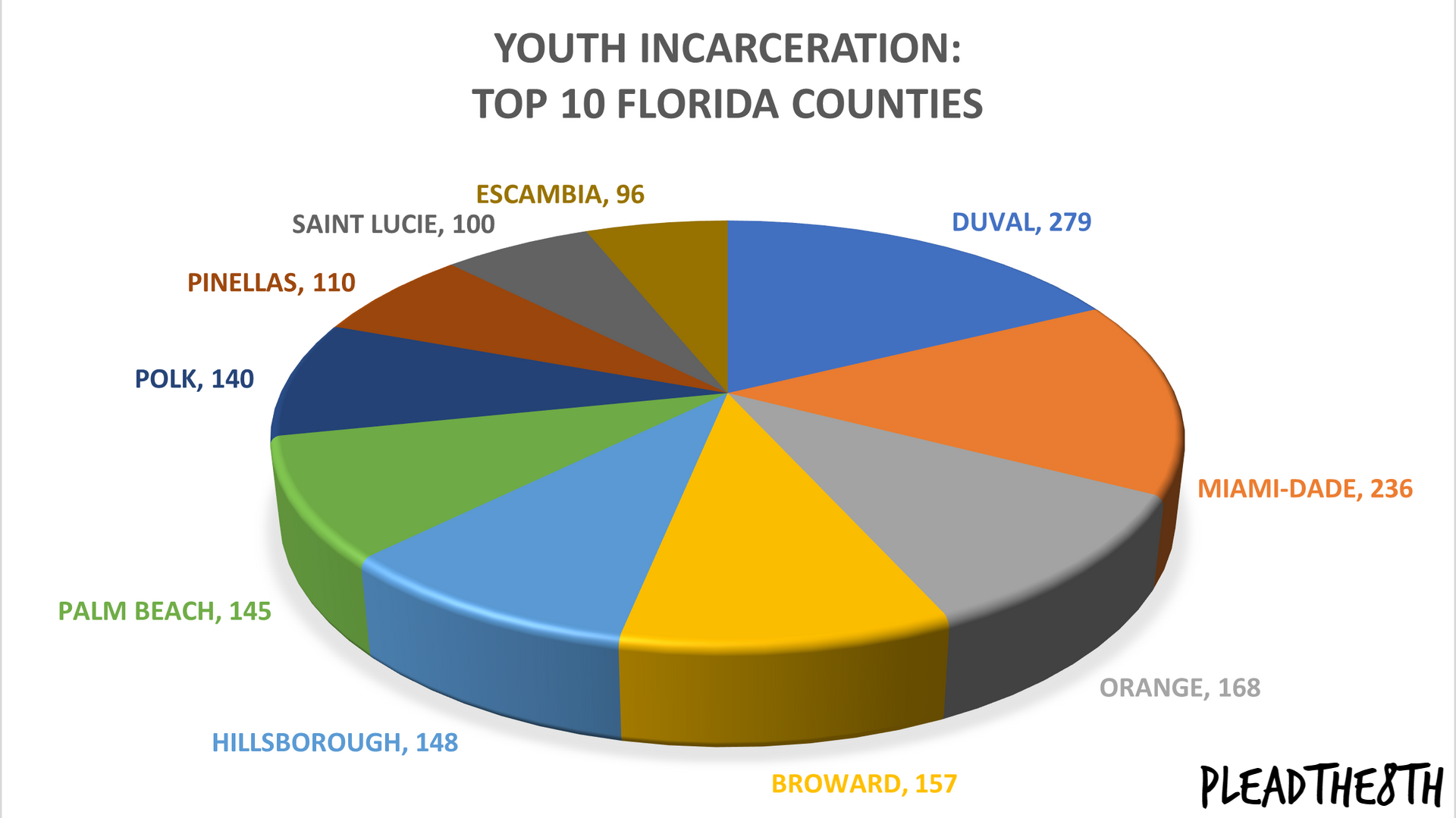
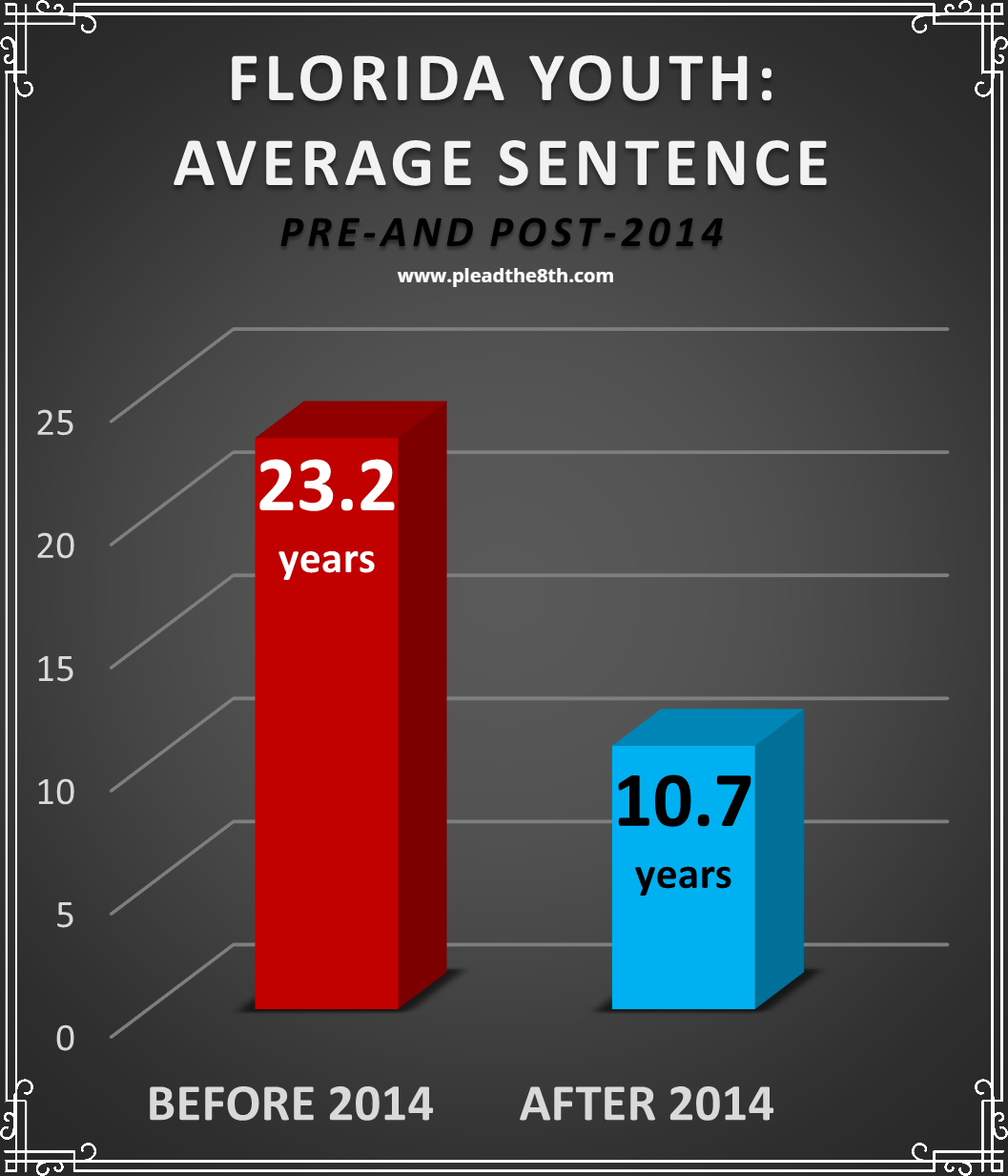
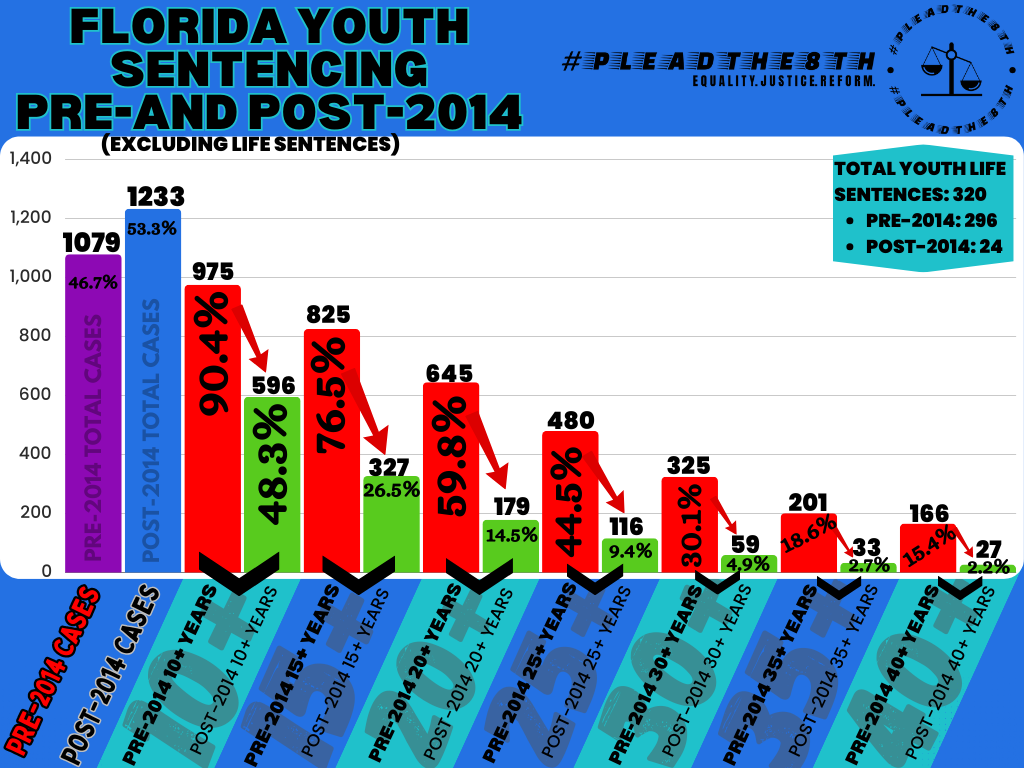
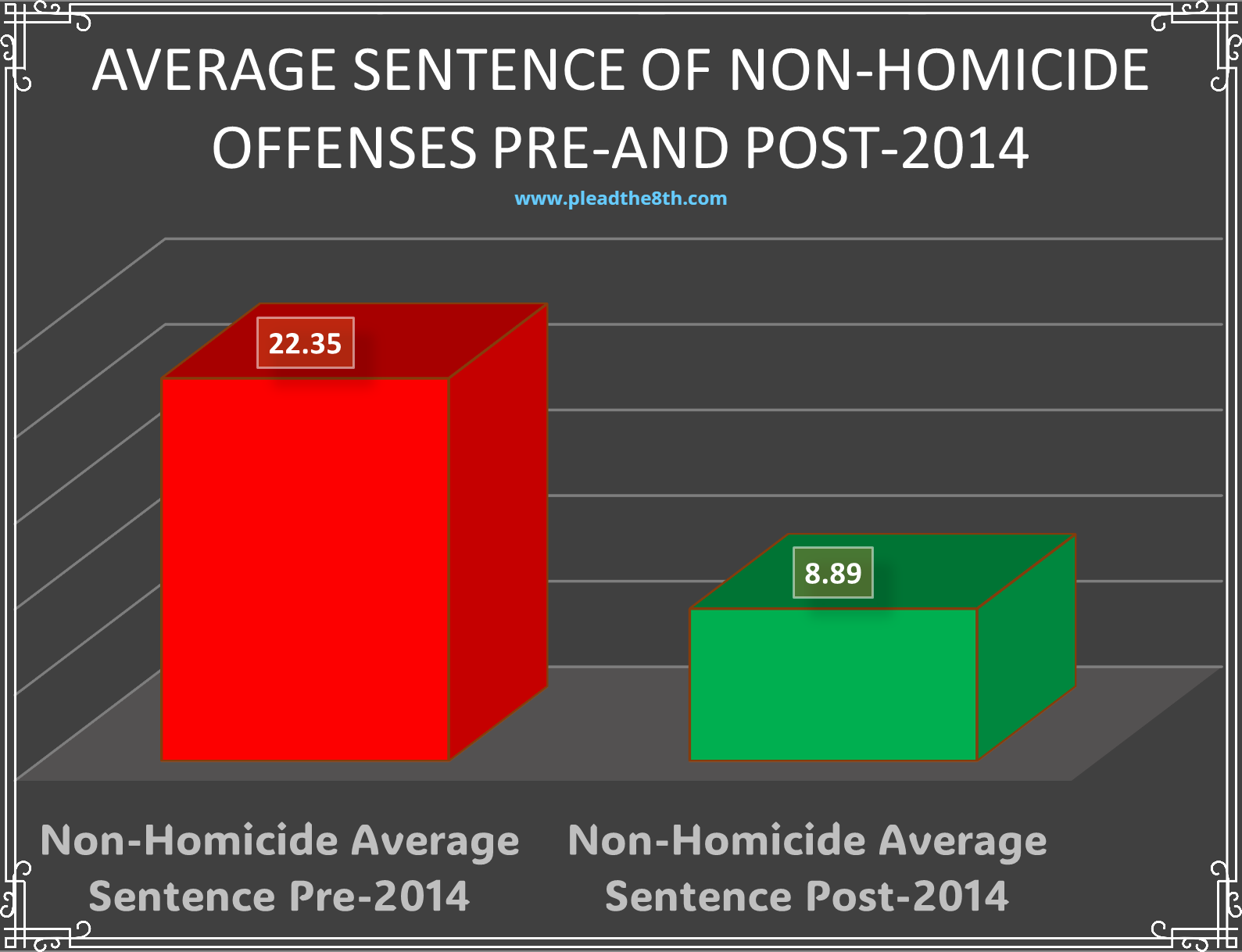
Sentencing Disparities: Non-Homicide Average Sentences Pre-and Post-2014
- Pre-2014 Sentencing Trends:
- A significant portion of these long-term sentences were given before 2014, indicating a trend of harsher sentencing in earlier years:
- Prior to 2014, the average sentence for non-homicide offenses was notably longer, averaging 22.3 years.
- Post-2014 Sentencing Trends:
- Following 2014, there was a significant reduction in the average sentence length for non-homicide offenses, dropping to 8.9 years.
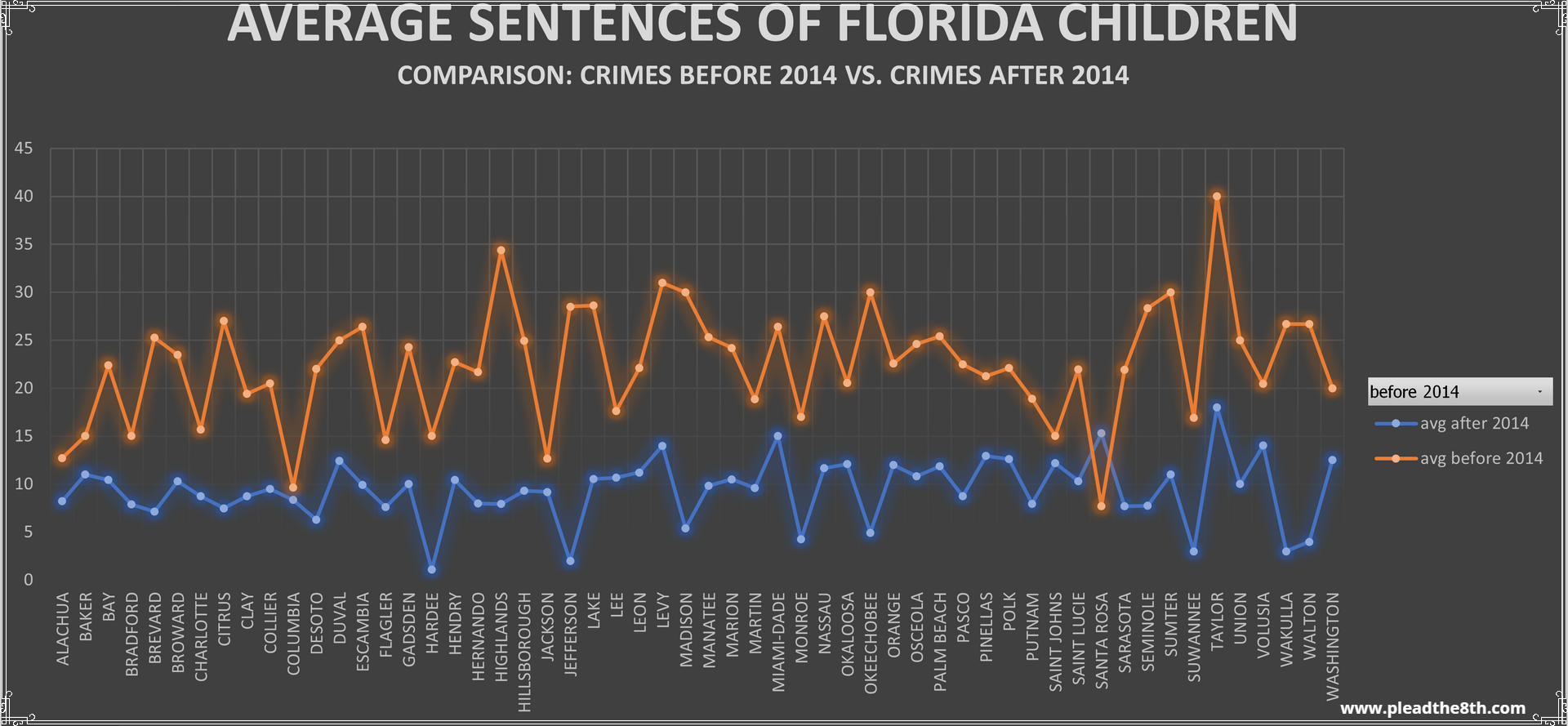
The data details the average sentences of children pre-and post-2014 by county of offense.
In a significant majority of Florida counties, post-2014 juvenile sentencing averages have decreased by more than one decade compared to the sentencing averages of children pre-2014.
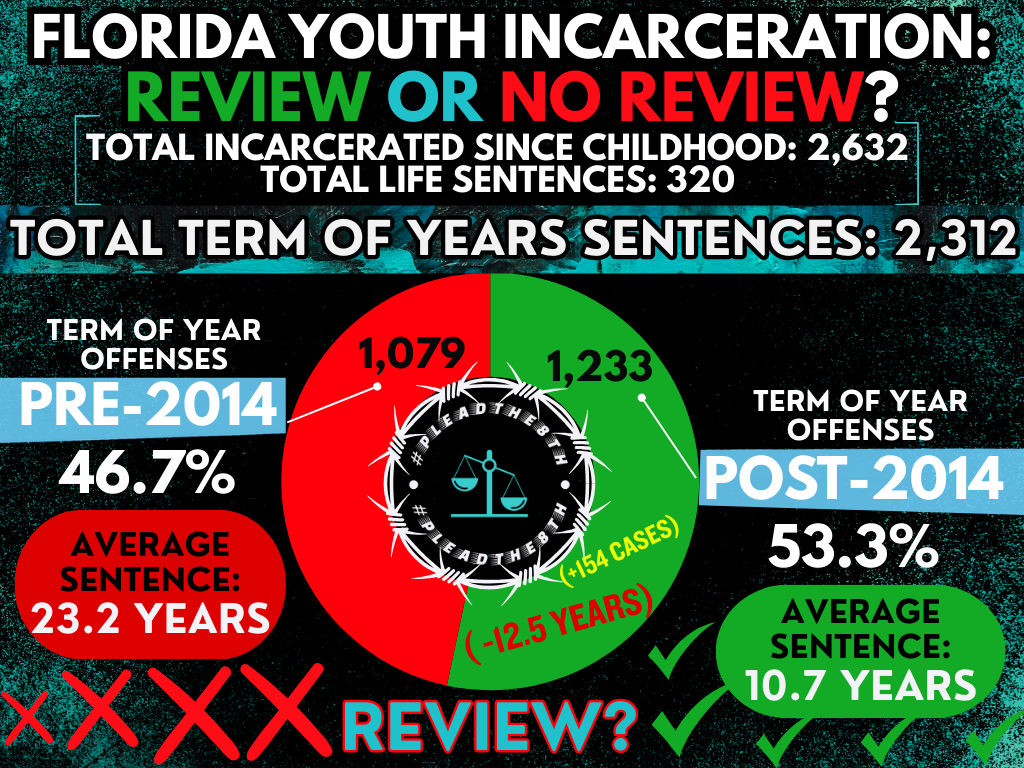
The definition of a "juvenile offender" under Florida law excludes individuals under 18 who committed crimes prior to July 1, 2014, raising concerns about equal treatment. While those who committed offenses after this date or that received life sentences have the right to review hearings, those with term-of-years sentences before July 1, 2014, do not share the same privilege. The absence of parole in Florida amplifies the impact of this disparity.
The inconsistency and confusion in Florida courts regarding the application of US Supreme Court decisions like Graham/Miller to juvenile sentencing further compound the issue. This situation raises questions about fairness and compliance with constitutional standards, as well as the need for comprehensive reform to ensure all youth have a review mechanism.
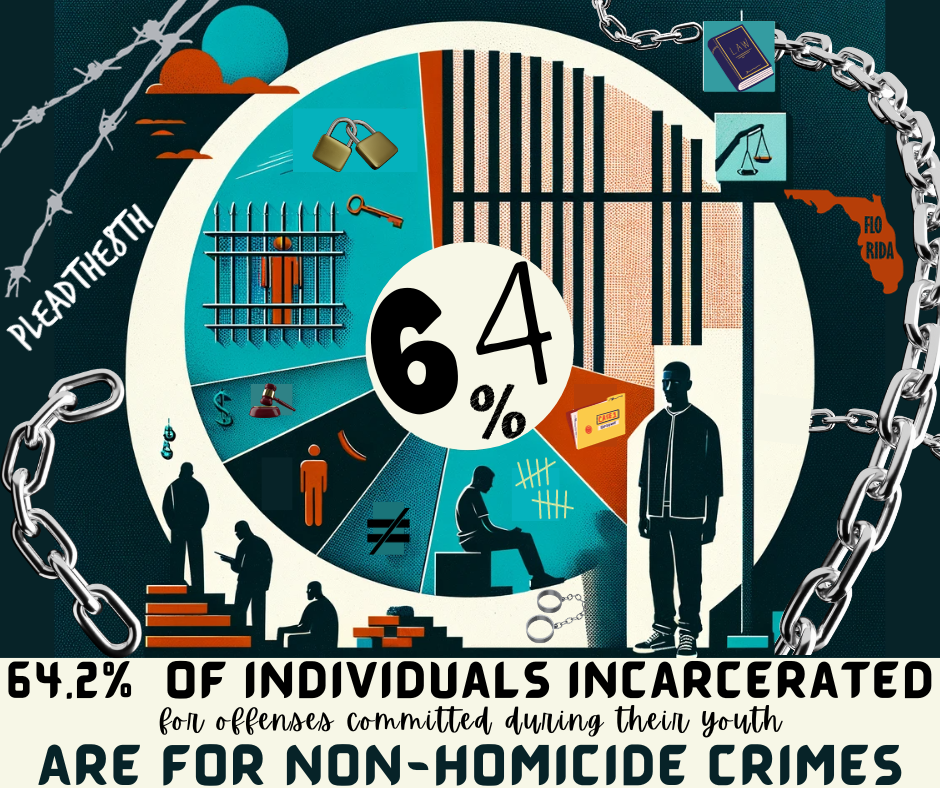
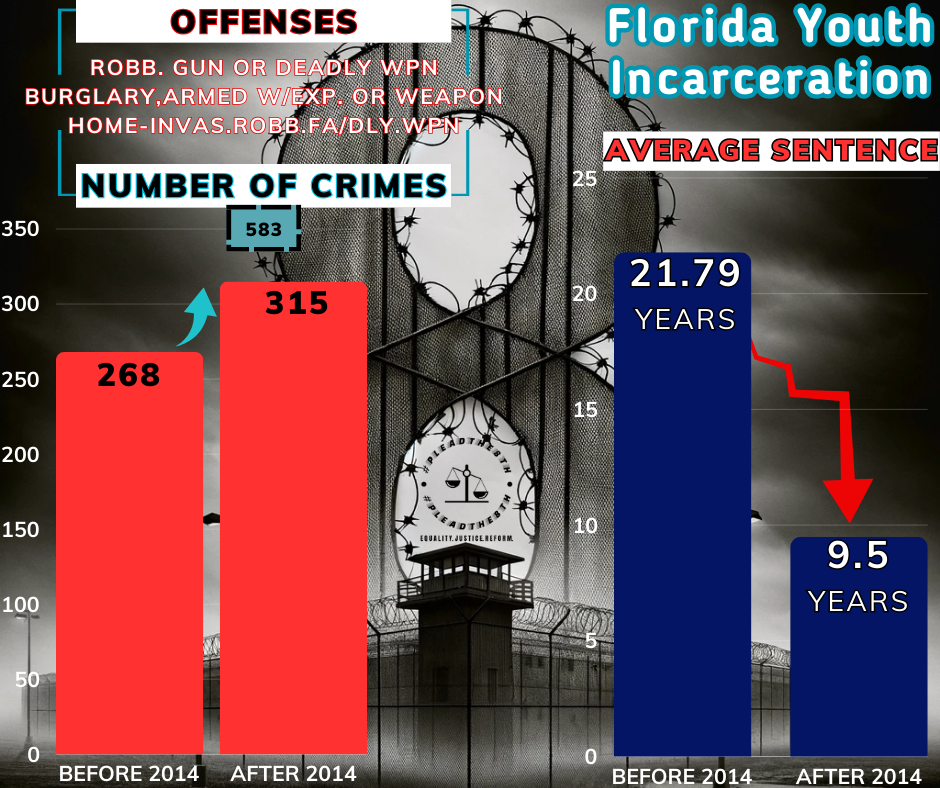
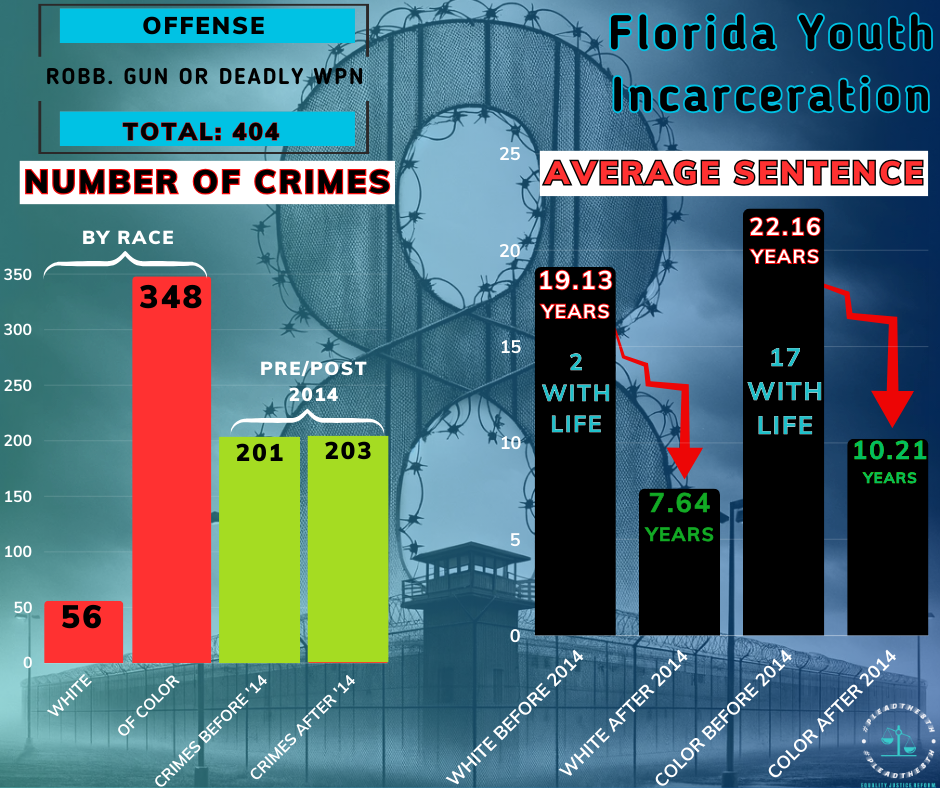
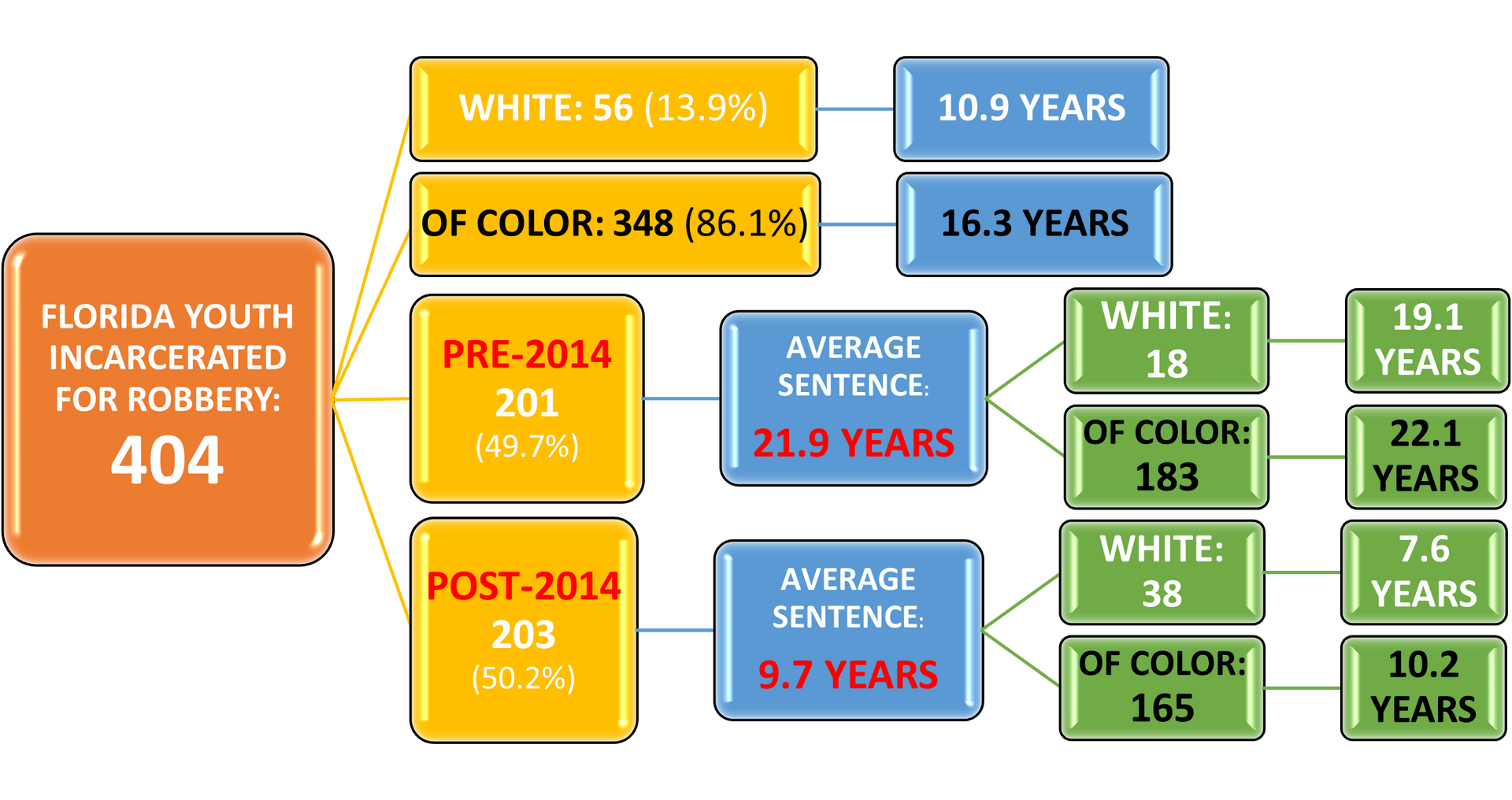

- Florida has 2,638 of the 32,000 nationwide currently incarcerated for crimes committed as children.
- Florida is 3rd in the U.S. with the number of individuals incarcerated since childhood.
- 10 states have 1,000 or more currently incarcerated for crimes committed while children.
- Florida has led the U.S. in prosecuting children as adults, while Florida prosecutors choose to transfer children to adult courts.
- 74.1% of the 2,638 incarcerated since childhood in Florida are of color.
- Of the 2,638 incarcerated since childhood in Florida, 329 have life sentences, 251 with sentences of 40 or more years, and 1,958 with term of-length sentences.
- The average sentence length of children incarcerated in Florida is 19.21 years in prison.
- The annual cost of incarceration for these 2,638 individuals is $50,304,022 and $1,034,592,790 cost of incarceration for their sentence durations.
- Total Florida kids in prison= 2,638, Black kids in prison = 1,815, % Black = 68.80%, Overall State % Black= 17.20%, Disparity Ratio= 4
- Racial disparities in sentencing are vast, with those of color receiving up to 68% longer sentences than Whites for the same crime and same scoresheet totals. This has resulted in many children being incarcerated decades longer than necessary.
- Florida still practices sentencing children to life without parole although 28 states have now banned this practice.
- According to the Human Rights for Kids 2022 National State Rating Report and 2020 State Ratings Report, Florida is “Tier Four: Worst Human Rights Offenders” which examines 12 categories of law of each state that are vital to providing a basic legal framework to protect the human rights of system-involved youth. Florida continues to show zero progress in meeting these international human rights standards.
- Florida has no review of sentences for all juvenile offenders. Florida laws are selective and only allow "some" kids a review.
- Florida laws are ambiguous. §.775.082 states that those under 18 are entitled to reviews pursuant to §.921.1402, yet §.921.1402 requires one to have committed the crime on or after July 1, 2014.
- 98 percent of youth prosecuted in adult criminal court in Florida are sent there by a prosecutor via a process known as “direct file.”
- State law allows prosecutors to charge 14- and 15-year-olds in adult court for any one of 21 specified felonies, and 16- and 17- year-olds for any felony at all.
- The prosecutor's decision to send a child to adult court via direct file is not subject to judicial review and cannot be appealed.
- Florida is one of only 14 states that use direct file and only one of three that doesn’t give judges the ability to review cases transferred.
- Of the 13 US states that report the rate at which they remove children from the juvenile system and prosecute them in the adult criminal system, Florida charged children as adults at a rate of 164.7 per 100,000 juveniles from 2003- 2008, almost twice the rate of Oregon, which came in second.
- Since 2009, the Sunshine State has prosecuted more than 16,000 children as adults.
- Between 2009 and 2013, in Florida alone, more than 12,000 children entered the adult system as a result of transfer laws, amounting to nearly 2,500 youth tried as adults on an annual basis.
- Of the children tried in adult court in Florida in 2012 and 2013, 60 percent had been accused of nonviolent offenses.
- Between 2008 and 2013, 59% of the children prosecuted in adult court were sent there for nonviolent crimes. Violent felonies accounted for 39% of the offenses for which children were sent to adult court; property offenses made up another 39% (burglary was the most common offense, making up 27.6% of transferred cases).
- In 2016,
Florida direct filed more children than California, Texas, Pennsylvania, North Carolina, and Michigan combined.
- A total of 904 children in Florida were transferred to adult court in fiscal year FY 2017-18, down from 1,128 in FY 2016-17.
- In 2018, 76.5% of cases transferred to adult court, the child was black or Latinx. Children of color made up 65.8% of juvenile arrests statewide.
- The number of children prosecuted as adults in FY 2017-18 in the First Judicial Circuit was 73 (which was a decrease from FY 2016-17 with 121), which was higher than more populous circuits, such as the Eleventh Judicial Circuit (Miami-Dade County) with 70 adult transfers, the Thirteenth Judicial Circuit (Hillsborough County, including Tampa) with 71 adult transfers, and the Fourth Judicial Circuit (Duval County, including Jacksonville) with 36 adult transfers.
- Direct-file cases against Florida youth declined in number to just under 800 in the 2020-21 fiscal year from roughly 12,000 in 2008-09, but the percentage of Florida juveniles who were tried as adults increased from 3.2% in 2019-20 to 3.7% in 2020-21.
- In 2020-21, 61% of juveniles transferred to Florida’s adult court were Black.
- Most Floridians are against direct file: 86% think children shouldn’t be held in adult jail while awaiting trial and 77% believe that a judge, not a prosecutor, should decide whether a child is prosecuted as an adult.
- Black kids fare worse when it comes to being jailed as adults: 63% of youth who are direct filed are black — although black children make up only 22% of Florida’s public-school kids.
- Due to safety issues, kids sent to adult jails are often held in solitary confinement — which is regarded as so psychologically damaging it’s considered “tantamount to torture.”
